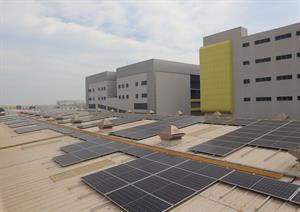GAC Bahrain has reached a major milestone in its drive to boost its sustainability with the installation of more than 550 solar panels on the rooftop of its warehouse in Bahrain Investment Wharf in Al Hidd.
 The solar array is expected to generate up to 487,000 kWh of clean and renewable energy annually and reduce GAC Bahrain’s CO2 emissions by more than 485 tonnes and make about 195 tonnes of standard coal savings in the first year – the offsetting equivalent of saving approximately 26,298 trees. Reputable renewable energy solutions provider Al Mannai Projects carried out the five-month long project in full adherence with all relevant local regulations and safety standards.
The solar array is expected to generate up to 487,000 kWh of clean and renewable energy annually and reduce GAC Bahrain’s CO2 emissions by more than 485 tonnes and make about 195 tonnes of standard coal savings in the first year – the offsetting equivalent of saving approximately 26,298 trees. Reputable renewable energy solutions provider Al Mannai Projects carried out the five-month long project in full adherence with all relevant local regulations and safety standards.
"We are fully committed to minimising our impact on the environment and taking further steps towards sustainability," said Johan Fulke, Managing Director of GAC Bahrain. "The solar panel installation is a significant milestone in our sustainability journey and demonstrates our dedication to reducing our carbon footprint and adopting renewable energy sources."
Talal Al Mannai, Chief Executive Officer of Al Mannai Projects, added: "We are delighted to have completed the installation of 550 Wp high-efficiency GCL solar PV modules, high-quality Al Mannai aluminium anodised solar mounting structure and balance of system (BOS) equipment for GAC Bahrain. The project was finished on schedule and met all international and Bahraini Electricity and Water Authority (EWA) standards."
The solar panel project is the latest part of GAC Bahrain's commitment to environmental responsibility, which is aligned with the wider GAC Group’s sustainability strategy that includes a commitment to UN Sustainable Development Goals, particularly Goal 7: Affordable and Clean Energy and Goal 13: Climate Action. By investing in renewable energy, GAC Bahrain aims to reduce its carbon footprint, lower energy costs, and contribute to a cleaner and more sustainable future.
Its efforts are also part of a larger trend towards renewable energy adoption in the Kingdom of Bahrain, which has set a target of generating 5% of its electricity from renewable sources by 2025, and the Kingdom’s Economic Vision 2030, which aims to reduce carbon emissions by 30% through local decarbonisation projects and doubling the development of regional renewable infrastructure.
Photo: Solar panel array